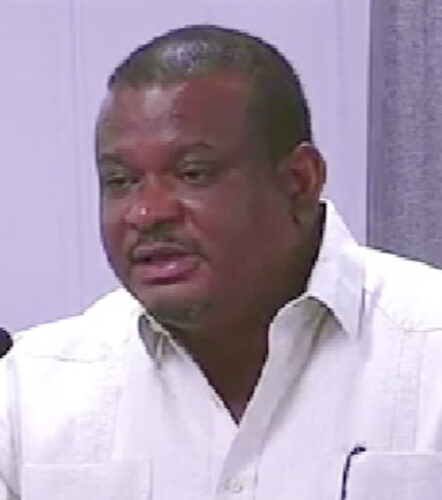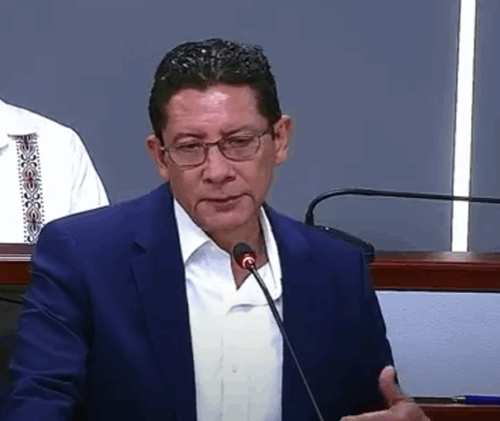Hon. Eamon Courtenay – Leader of Government Business in the Senate
BELMOPAN, Monday, July 14, 2025
After preliminary proceedings, today’s extended Senate meeting moved into the discussion of the “Resolution to Support Democratic Taiwan and Strengthen Bilateral Bond Motion, 2025.” The motion received unanimous backing, with senators affirming Taiwan’s sovereignty and territorial integrity amid China’s claims which restrict Taiwan’s presence in the international order. One matter that drew a response from the Leader of Government Business in the Senate, Hon. Eamon Courtenay, was raised by Lead Opposition Senator, Hon. Patrick Faber. He noted that as Minister of Education, he had pressed Taiwan to assist in having Belizeans who receive scholarships return home to contribute to the country’s development – at least for some time.

Hon. Patrick Faber, Lead Opposition Senator
Courtenay himself has raised the issue before while he was foreign minister, and today he revealed that Taiwan is offering Belizean students jobs to teach English as a second language. Courtenay affirmed that it is counterproductive for Taiwan to promote the development of Belize and give Belizeans higher education, and to then “seduce them to stay in Taiwan.” He added, “These scholarships are given to Belize … it is not a situation where a student has gone out and applied directly to Taiwan …”
Senate holds Bail Bill in committee
Serious concerns raised by several senators regarding the Bail Bill led to the piece of legislation being held in committee for further discussion. The bill, which has been hailed as progressive in modernizing the bail framework, consolidates several legal provisions on bail, and replaces the Bail Reform Act of 1999.
Courtenay said the comprehensive bill makes bail “more available” to detained persons, and sets out clear provisions for the right of appeal and for the provision of security and forfeiture of security. However, while the Opposition deemed some of the provisions commendable, they had concerns about fundamental rights being curtailed, and the poor and marginalized being disproportionately affected.
Among the positive aspects of the bill as cited by Faber, is the introduction of electronic monitoring tools (ankle monitors), curfew for those granted bail, and regular reviews and appeals.
Faber then proceeded to cite the concerns as they were introduced in the Lower House. He spoke about the availability of judges in rural areas, and the potential impartiality of police officers who would be allowed to decide bail for offences punishable on summary conviction. He described as excessive the penalty for absconding, and said some may have justifiable reasons. He also expressed concern that restricting bail decisions to judges alone for an array of offences, including immigration offences and traffic offences, is limiting. Additional limitations he cited include the exemption of certain persons from giving surety, including teachers, community leaders and religious ministers. He shared that Section 19 prohibits using the same property as security for more than one recognizance without the court’s permission.
Faber also has an issue with the ministerial discretion, provided under Section 21, that allows for the minister to amend penalties and schedules via regulation subject to negative or affirmative resolutions. He recommends that magistrates also be allowed to grant bail for a wider range of offences, especially for non-violent and first-time offenders. Faber commented, “This bill as currently drafted, risks turning our justice system into one where freedom before trial is a privilege reserved for the wealthy and the connected.” Opposition Senator Sheena Pitts questioned if we have “lost the fundamental principle of presumption of innocence,” as she made the point that bail should be affordable and devoid of hurdles. She also suggested that they require that the condition of the detainee be recorded at the time they are delivered at the prison. Her explanation is that the police have become “ingenious or disingenuous to start to lay blows in areas you wouldn’t think to look. Shock therapy in areas …”
People’s United Party senator Amini Galvez pointed to Section 10(3) of the bill which mandates judges and magistrates to conduct bi-weekly review of cases for persons who, although granted bail, remain in custody because they cannot afford it. In the case of new evidence surfacing, Galvez noted that defendants will be able to reapply for bail. In the event that police officers deny bail unfairly, she shared that the decision could be challenged, but added that for a police officer to act in such a manner would be considered a breach of the new law, which outlines specific criteria for bail, including that it must be considered within 48 hours of arrest. Galvez highlighted that the bill provides for defendants to provide surety for themselves once they can show proof of assets.
In the case of interim Church senator, Kerm Thimbriel, he lauded the bill as progressive, but also highlighted some concerns, including that police officers would be able to detain a defendant who is on bail without a warrant if they have reasonable grounds to suspect that the defendant is likely to breach the conditions of his bail. He noted that there have been instances of police officers irresponsibly using those provisions.
In wrapping up the debate on the bill, Senator Courtenay emphasized that there is no intention to prejudice, punish or marginalize sectors in our society, and remarked, “I’m not persuaded it does that, but I want to put on the record that that is not the intention of the legislation.” He also underscored that the Constitution refers to an entitlement to bail, not a right to bail, because “there is a need to strike a balance,” as communities are also entitled to live in peace. Courtenay then reported that after hearing the discussion, and in consultation with the Attorney General, it was decided that the bill should remain in committee for further discussion, and then it will be brought back along with the Magistrate Court Bill to allow for the discussions on all judicial legislation to take place together, when the Senate convenes after recess in September or early October.
Passed with amendments was the People’s Constitution Commission (Amendment) Bill, 2025 to extend the time for the Prime Minister to lay before the National Assembly the report of the Commission.
Passed without amendment were the Insolvency and Bankruptcy Bill, 2025; the Central Bank of Belize (Amendment) Bill, 2025, and the Law Revision and Law Reform Bill, 2025. From the outset, Senator Courtenay notified the Senate that the National Assembly (Powers, Privileges and Immunities) Bill, 2025 will be discussed during the recess of the Senate so concerns can be addressed.
Senate passes bill for UK and Taiwan trade duty reductions
The Customs and Excise Duties (Amendment) Bill, 2025 was among the bills passed by the Senate without amendment. The purpose of the bill is to implement – as part of respective economic partnership agreements – duty reductions for a list of products from the UK and Taiwan. Opposition senators expressed concern that Belizean producers and food security could be threatened. Senator Faber proposed an impact assessment within six months for the fisheries and agriculture sector, and also extended timelines of introduction for the most vulnerable sectors, including live animals, fish and vegetables and fruits. He additionally recommended that a portion of revenues from remaining duties be reinvested directly into the agricultural modernization of Belize.

Hon. Christopher Coye – PUP Senator
People’s United Party senator, Christopher Coye explained that the benefit of the agreement is that Belizean exporters to the UK since 2008 receive complete duty exemptions on goods, whereas the duty reduction on specific goods Belize imports from the UK would be done in a phased approach. In the case of Taiwan, he says the agreement is similar, and there is a list of over 113 goods from Belize that already benefit from duty exemption. He noted that with Nicaragua and Honduras severing diplomatic ties with Taiwan in recent years, Belize now has an opportunity to fill the export gap left by those major shrimp suppliers. According to Senator Coye, while our shrimp industry has faced severe challenges, shrimp production is once more going up, and Belize has finalized certification to export shrimp to Taiwan. In the case of lobster, he said that Belizean exporters are already benefiting, as the duty exemptions put the price of the products below market prices.
Coye also stated that the gradual duty reduction on imports from Taiwan is actually another benefit, because we would be paying less for those products which we don’t produce here.
For his part, Courtenay explained that the agreement, in the case of the EU, replaced preferential access (that was coming to an end) with “stable and predictable access to the European market.” He further detailed that Belize was given an opportunity to liberalize its market in a phased-in approach that could take place over a period of up to 25 years, and indicated that there are safeguards that would involve imposing quotas or increasing the tariff if there is a surge in imports that would have a negative impact on domestic produce, and also exclusion lists of products that can never be granted tariff reductions. He indicated that “these are not things that are produced, in the main, in Belize.” According to Courtenay, the agreement is much broader, and includes commitments on trading services, investment, trade-related issues like competition, policy, government procurement and intellectual property and others.
Composition of JPAC announced
The composition of the new Joint Public Accounts Committee (JPAC) was announced at today’s sitting of the Senate. The JPAC is the only parliamentary committee not chaired by a member of the ruling party. It is tasked with reviewing the government’s accounts and addressing accountability in public spending.
Four of the 9 members are drawn from the parliamentarians for the ruling party and two from the Opposition. The remaining three are social partner senators nominated by the Senate President.
The members from the House of Representatives were appointed on May 12. They are Lee Mark Chang, Julius Espat, Kevin Bernard, Kareem Musa, Dolores Balderamos-Garcia and Godwin Haylock. The senators on the committee will be Kevin Herrera, Janelle Chanona and Glenfield Dennison.

